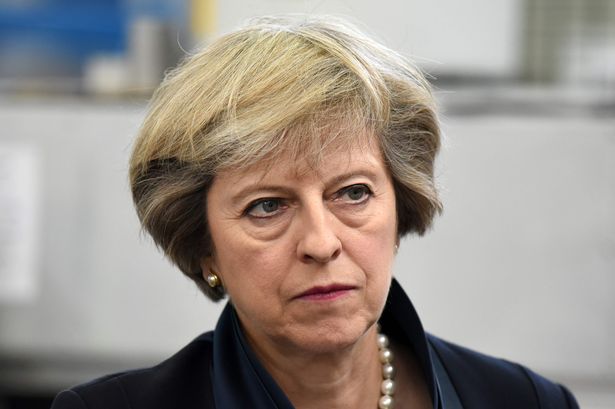I’m no mental health professional so please excuse the “cod psychology” in this post!
- Does being Prime Minister make you mad (as in “insane”, not just “very cross”)?
- Is Theresa May mad?
Mad Mag
I have absolutely no doubt that Thatcher was insane when she was deposed by the Tory Party. My evidence for this? I had the dubious pleasure of “meeting” her about a year after John Major took over. Specifically, I was a guest of a company CEO at a regional lunch meeting of the Institute of Directors and Thatcher was after-lunch speaker. (Yes, I know! The things I did to earn a crust!) The table where I was seated was 5 to 10 metres at most from Thatcher’s lectern. It was the eyes that convinced me. Barking, without a doubt. And very scary to be that close. Enough said: it still sends shivers down my spine just to think of it.
Mad Blair
I believe there is a case to answer that Tony Blair, over the decade he was PM, developed some kind of mental health issues. Compare the “before” and “after” pictures below. He suffered some form of premature aging, I’m sure.
Probably he wasn’t totally out with the fairies like Thatcher was, but rather he was well on the way by the time he handed the baton to Gordon Brown. Was it the promise he made to George W Bush that started the mental decline? I leave that to you to judge. There is certainly a case that being under the constant pressure of 24 hours rolling news media puts a great strain on any human being. The peculiarly adversarial approach to politics in the English-speaking world creates further pressure. And Labour PMs face the additional burden of the hysteria of the mainly right-wing press, the most one-sided in Europe.
Mad Nad
But you don’t have to be PM to be mad: sometimes just being an MP will do. I have the misfortune to have Nadine Dorries as the MP for a constituency bordering on mine. She rightly earned the epithet “Mad Nad” as a nickname used by her political opponents long before the “Get Me Out of Here” days. Certainly there has never been any evidence of any neural connection between her mouth and whatever passes for her brain. She can be guaranteed to say something stupid at the drop of a hat. So it’s hardly surprising that she has emerged as one of the most extreme MPs over the question of the UK leaving the EU.
Mad May
And so to Theresa May and my second question.
Several of my earlier posts have made reference to May’s character and personality traits. May’s fans and spin doctors (of which I am clearly neither) could, at one time, have suggested these were virtues. May at one time had a reputation for levelheadedness and was seen as a moderate, by Tory standards. Some traits have always been clearly negatives: her refusal to trust people or take advice, her apparent inability to socialize and her tendency for obsessive behaviour have always been worrying signs. Her prime obsession, in my view and that of many others, was over immigration, which has coloured her whole approach to negotiations with the EU. Commentators have remarked also on her total lack of understanding, or care for, people outside a narrow circle of Tory Party members and supporters. I now place trying to avoid a split in the Conservative Party as another true obsession which has emerged more clearly over the past year or so.
I stand by my “Mister Men” caricature of her as “Little Miss I-Know-Best” as an accurate assessment.
Three Phases
So is she mad, in the medical sense? I think we need to break down her time as Prime Minister into three phases. We must also remember her as the author of the “hostile environment” whilst Home Secretary, also adopted in the DWP, which has led to incalculable misery for UK citizens of colour, would-be asylum seekers and the disabled, poor and most vulnerable of our citizens.
Phase 1
Phase 1 was in the early months of her premiership. She made a massive error of judgement by pandering to the far right anti-EU fanatics in her party in the first Conference speech as leader and Prime Minister. Her famous “red lines” boxed her negotiating position in too soon and she rejected any bipartisan approach to the UK’s negotiating position. Her perceived necessity to balance remainers and leavers in her initial Cabinet appointments led to some extraordinarily bad choices. The UK’s reputation abroad will take decades to recover just from May’s decision to appoint Boris Johnson as Foreign Secretary, let alone the other appalling mistakes.
Her other major act of bad judgement was in triggering the Article 50 process too soon, before she had any proper plan how to proceed. Her focus was on Tory Party unity, not the views of the EU27, especially that of Ireland. Even before the 2017 election, the DUP dependency and bribe, May saw Ireland simply from the narrow perspective of maintaining the unity of the UK. Ireland’s and Scotland’s wishes (and Remain majorities) were ignored and Wales probably didn’t even get a second thought.
But there was a lot of hubris in the air and in the Tory Party – although May herself denied six times she would call a snap election – until she called one. Her rabid cheerleader, the Daily Mail, ran the headline “Crush the Saboteurs”. May was intending at this phase to use so-called “Henry VIII powers” to override Parliament and act as an absolute ruler over key aspects of the legislation needed to leave the EU. Gina Miller, who successfully challenged this approach in the courts, was vilified by Tories and their cheerleaders alike.
But even during this time, I saw May as someone with poor judgement, a tendency to authoritarianism, but with no clear evidence of mental health issues.
Phase 2
The second phase followed the 2017 election and the creation of a hung Parliament. May could have attempted a multi-party coalition even then, but chose instead to throw her lot in with the DUP – the most unrepresentative bunch of bigots imaginable to represent the interests of the people of the Six Counties and to protect the 20 years of peace brought about by the Good Friday agreement.
May’s room for manoeuvre was even more hemmed in by her pact with the devils of the DUP. But there were long periods of vacillation, key votes delayed or postponed as she agonisingly tried to get first a negotiating position and then an agreement with the EU that would (just about) hold her Cabinet and most of her Party together. Who now remembers what the Chequers deal said? It’s been drowned out since by talk of backstops, time limited or not and much tactical posturing by Tory Party factions – Labour too. (Remember the agonies of the wording of the Labour Party’s position?)
But I think this phase came to a crashing halt last month when her agonizingly-crafted position was rejected in the Commons by a massive 230-vote margin. But still, I would say, no clear evidence of May actually going mad.
Phase 3
This phase is continuing. May’s position has see-sawed between further appeasement to the far right in her Party and a cynical and insincere reaching out to placate some of Labour’s demands on workers’ rights in particular. May’s underlying personality flaws have always made her a bad choice for Prime Minister (but, throughout the relevant period, all the other candidates are worse). But the shock of the size of her Commons defeat was followed by the pseudo-reprieve of the “unicorn” key vote. Based almost entirely on Tory and DUP votes in favour, Parliament instructed May to return to Brussels to negotiate “alternative arrangements” to the Irish backstop.
This is perhaps the second low point in recent years for the UK parliament. A mixture of cowardice and delusional fantasy by mainly Tory MPs voted for an impossible fudge driven by a forlorn desire to put Party unity above national interest. (The first low point was in 2015 when Parliament agreed to hold a referendum without any of the usual safeguards that a country with a proper constitution would already have considered, e.g. a super-majority needed for change.) But my main point is that the combination of the shock of the 15 January defeat and the cover provided by the “unicorn” vote on the 29th has tipped May over the edge.
May still refuses to rule out “no deal”. This is a position of supreme folly and a criminally irresponsible way to treat a mature democracy. We can infer that Party unity is now May’s only driving force and her stubbornness, which some saw as a virtue, is now pathological.
The UK on Valentine’s Day 2019
So, welcome to the current reality. May is doggedly pursuing her unicorn in a rabid and illogical attempt to hold both the mad and sane wings of her party together. She marches, blinkered, towards the cliff edge. All the alternative Tory candidates for leadership seem to belong to the mad faction of the party. Labour, under Corbyn, dithers.
The only people who approve of our plight are some neo-fascist fringe parties in mainland Europe, Vladimir Putin, Donald Trump and others of their ilk. The rest of the world thinks we’re mad.
I once wrote a blog post called “Respect”. Pah!




